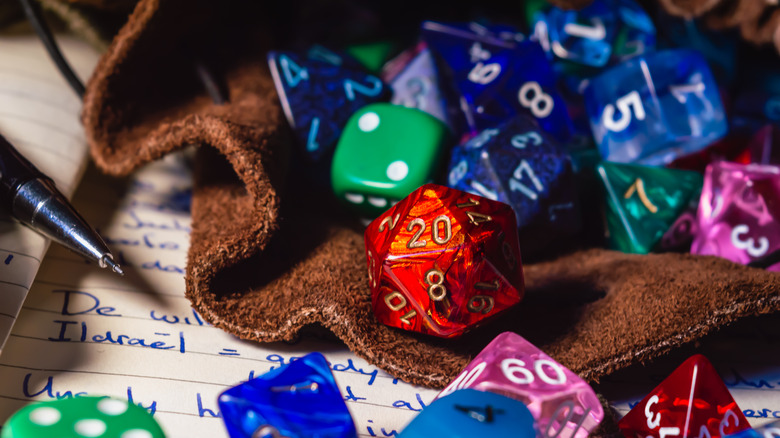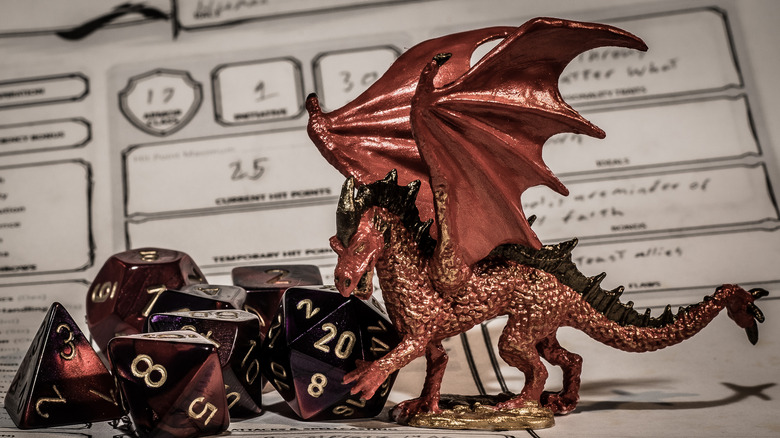How Stranger Things' Vecna Is Different From The Dungeons & Dragons Character
This article may contain spoilers for Season 4 of "Stranger Things."
Season 4 of the wildly popular Netflix series "Stranger Things" checks back in with the gang from Hawkins, Indiana — a place where supernatural things just won't stop happening. Returning to the series are familiar faces like Eleven (played by Millie Bobby Brown) and Max Mayfield (played by Sadie Sink), among others. Like previous seasons of the hit show, there's also a new villain hailing from the so-called Upside Down — and just like previous installments of "Stranger Things," this new baddie is drawn straight out of "Dungeons & Dragons" lore.
Perhaps one of the most well-known role-playing tabletop games ever made, Dungeons & Dragons (or D&D for short) has served as inspiration for "Stranger Things" creators Matt and Ross Duffer from the beginning, according to TIME. For Season 4, the main antagonist this time around looms large in the imaginations of D&D aficionados worldwide: Vecna.
However, while Vecna in the Netflix series bears similarities to the original D&D version of the character, the onscreen depiction diverges from the D&D "Monster Manual" in some crucial ways (via Variety).
In Dungeons & Dragons, Vecna is a lich
The character of Vecna was even further developed in later versions of D&D that were released in 1989. (The current season of "Stranger Things," set three years earlier, predates much of the RPG villain's development, according to The New York Times — but who's counting). Otherwise, Vecna was a lich, which is an evil wizard who used his powers to gain immortality. Alas, those same powers he used to stay alive forever can't stave off decomposition, so D&D's Vecna must live in an old rotting corpse, according to D&D Beyond.
As is often the case with fantasy villains, never dying just wasn't enough for Vecna so he set about gaining godlike powers. As original D&D game designer Chris Perkins said to TIME, the now-legendary Vecna was once mortal but "[H]e's always looking for the next big thing ... godhood was sort of his quest for a long, long time." And after achieving godhood, Vecna still was unsatisfied. Vecna, Perkins continued, "wants to be the greatest of the gods, eliminate all rivals, and learn the secrets of the multiverse itself."
D&D's Vecna knows all your secrets
Similar to the common version of Vecna from D&D, the "Stranger Things" Vecna shares a similar decomposed look in his true form, although the RPG version is rarely seen as human as the character Vecna is seen in the show, as Digital Spy notes — rarely that is, except for when Vecna took the form of a demigod in the 1990 D&D module "Vecna Lives!" according to the Dungeon Masters Guild website. Another similarity between the show's version of Vecna and his original D&D character is that both have issues with their mother.
Where the character of Vecna might differ most between "Stranger Things" and D&D is the exact nature of the character's powers. Sure, D&D's Vecna has magic powers and the "Stranger Things" character certainly displays similar supernatural abilities, too. It's the exact nature of those abilities that's not quite the same.
In the case of D&D, Vecna knows and preys upon all your innermost secret thoughts. He is a wholesale evil character with no further goals besides amassing power and dominating others (usually gods) with the secret knowledge he's amassed. The TV version of Vecna, though, seems to sense painful points from the character's past before he torments them through their already-existing guilt. He doesn't necessarily reveal and collect a person's secrets, but claims to be fighting for the greater good — he alleges that he wants to show someone their true character and wishes to restore balance to nature (via ScreenRant). And don't forget, D&D's Vecna only has one eye, while the TV version is blessed with two peepers.


